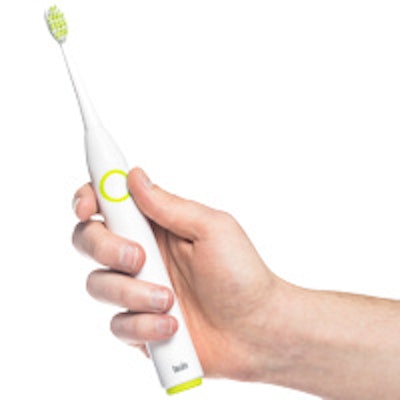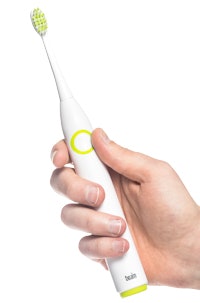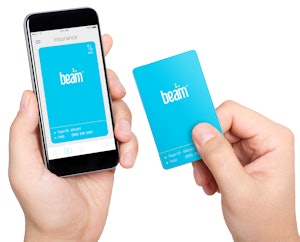
Beam Technologies, the company behind an Internet-connected toothbrush, is now using data and design to change the status quo of dental insurance. In late August 2015, the company officially rolled out its group insurance plan, which approaches dental insurance with technology-first thinking.
 Alex Frommeyer is the CEO and co-founder of Beam Technologies.
Alex Frommeyer is the CEO and co-founder of Beam Technologies.Beam group insurance is fully HIPAA-compliant, has 200,000 sites where dentists see patients, and is in all 50 states. The premise is that by using behavioral data from its smart toothbrush and associated app the company can better predict how daily oral hygiene affects dental disease development and treatment. Beam then uses that data to help educate users and positively change their behavior, potentially saving everyone money over time.
"Dental insurance leaves a lot on the table in terms of innovation and user experience. There's a huge uninsured population ... and even among those who are insured or have some sort of dental benefits, plans tend to be pretty flatly designed and priced," Alex Frommeyer, Beam's CEO and co-founder, told DrBicuspid.com in an interview. "So Beam's founding thesis was to see if we could use better data, better design, and a fresh technology-oriented approach to improve on some of the shortcomings of the insurance industry problems."
Changing the user experience
 The Beam Brush is an Internet-connected toothbrush that helps users improve their brushing frequency and quality.
The Beam Brush is an Internet-connected toothbrush that helps users improve their brushing frequency and quality.Beam is not new to the dental industry. The 3-year-old start-up is most known for its Beam Brush, a connected, smart toothbrush that tracks brushing time and quality, and then uses an app with game-like elements to positively change the user's behavior. However, offering technology-first insurance was closer to the vision that Frommeyer and others had for the company.
Unlike traditional insurance that focuses exclusively on in-clinic prevention, Beam takes insurance into user's homes. Beam's members get the smart toothbrush and smartphone app, as well as a digital copy of their insurance card. Companies who use the plan can also combine Beam insurance with Beam Perks, another new service that delivers a replacement toothbrush head, floss, and toothpaste to users every three months.
"One of the first things we're interested in teaching the market is that we care about both parts of preventive care in dental services," Frommeyer said. "That will not only create a healthier patient ... but it also helps the dentist run a practice that's more focused on providing care where it's most needed. Dentists certainly want to see they can run a better practice off of patients who are more engaged with their health and more aggressive about preventive care."
Frommeyer noted that the insurance plan works similarly to others that dentists already accept.
"We really want to make sure we are introducing an experience that is better but is also familiar," he said. "The key is that we want to carefully introduce what we think is a better way for all. ... Our goal at first is to meet the expectations of the dentists and then blast them out of the water over time."
Will it work?
While Beam will track user habits, the insurance price will not change based on the frequency or quality of brushing. Instead, Frommeyer believes that by giving its members well-designed technology, it can actually change the way people approach and treat their oral health. For example, he noted that 63% of brushing events recorded through the Beam Brush are at or longer than two minutes.
 The Beam Dental app connects with the Beam Brush and also houses important insurance information.
The Beam Dental app connects with the Beam Brush and also houses important insurance information."For us that's a huge internal achievement that we celebrate, because we know that's nowhere near true with any study that's been done on brushing behavior and oral hygiene in the past," he said. "What it suggests is that by introducing an elegant technology, you can have an impact on people's engagement with dental health. We think that's an encouraging sign for our ability to make a positive influence within the dental industry in the future."
The company is also interested in hosting discussions with dentists, Frommeyer said. Dentists are excited that there is something different in the insurance marketplace and have ideas for new ways that it can help their patients, he noted. Dentists who have feedback or want to learn more, can call Beam's customer support or email them at [email protected].
As for immediate next steps for Beam, the company is releasing the full Android version of its app in September. But the focus remains on the user experience.
"I would say that what we're most focused on as a company right now is really mastering the user experience of dental insurance, which I can't understate," Frommeyer said. "One of the biggest things that we've seen after peeling back the veil on how the process works currently is that there has been very little commitment and care to user experience. ... I think there's a lot to be done to improve that process drastically."



















